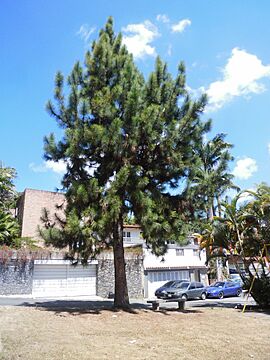Caribbean pine facts for kids
Quick facts for kids Caribbean pinePinus caribaea |
|
|---|---|
 |
|
| Pinus caribaea specimen in El Hatillo, Miranda, Venezuela | |
| Conservation status | |
| Scientific classification |
|
| Kingdom: | Plantae |
| Clade: | Tracheophytes |
| Division: | Pinophyta |
| Class: | Pinopsida |
| Order: | Pinales |
| Family: | Pinaceae |
| Genus: | Pinus |
| Subgenus: | Pinus subg. Pinus |
| Section: | P. sect. Trifoliae |
| Subsection: | P. subsect. Australes |
| Species: |
P. caribaea
|
| Binomial name | |
| Pinus caribaea Morelet
|
|
| Script error: The function "autoWithCaption" does not exist. | |
| Synonyms | |
|
Pinus hondurensis Sénéclauze |
|
Script error: No such module "Check for conflicting parameters".
The Caribbean pine (Pinus caribaea) is a strong type of pine tree. It grows naturally in Central America and the northern West Indies. You can find it in places like Cuba, the Bahamas, and the Turks and Caicos Islands.
This tree lives in warm, wet forests. It grows in open savannas and also on mountains.
Contents
What are the Types of Caribbean Pine?
Scientists have found three main types, or varieties, of Caribbean pine. Each variety grows in slightly different areas.
Pinus caribaea var. caribaea
This type is also called pino macho, Caribbean pine, Nicaragua pine, or pitch pine. It grows in western Cuba, in places like Pinar del Río Province and Isla de la Juventud.
Pinus caribaea var. bahamensis
This variety is known as Bahamas pine, Caicos pine, or Caribbean pine. It is found in The Bahamas and the Turks and Caicos Islands.
Pinus caribaea var. hondurensis
This type is simply called Caribbean pine. It grows in Mexico (in Quintana Roo and the Yucatán states), Belize, Guatemala, El Salvador, Honduras, and Nicaragua.
Where Do Caribbean Pines Grow?
Scientists believe that these pine trees first came to the Caribbean from the southeastern United States.
For example, the pines in the Bahamas likely came from Florida. This happened about four or five thousand years ago. It was long after the last Ice Age ended. The climate became much wetter then, which helped the trees spread.
During the Ice Age, about 18,000 years ago, the sea level was much lower. The Bahamas area was a dry grassland, not a forest.
Studies of tree genetics show that the Caribbean pine originally came from Central America. Pines reached the Caribbean islands from Central America at least two times. One group went to Cuba, and another group went to the Bahamas.
How Do Wildfires Affect Caribbean Pines?
Wildfires are very important for where these trees grow. The Caribbean pine grows back quickly after fires. It can even replace other types of trees after a fire.
If there are no fires, other broadleaf trees will start to grow. These trees will eventually replace the pine forest. Young pine trees need a lot of sunlight to grow. Once they are older, they can resist fire.
What Are Caribbean Pines Used For?
The wood from Caribbean pine trees is very useful. It is used to make lumber and pulpwood. Lumber is wood cut into boards. Pulpwood is used to make paper.
Shipping this wood to Florida is a main export for the Abaco Islands.
Are Caribbean Pines in Danger?
Overall, the Caribbean pine is considered a species of least concern. This means it is not currently at high risk of disappearing.
However, two of its varieties are in more danger. The caribaea variety is considered endangered. This means it is at very high risk of disappearing. The bahamensis variety is considered vulnerable. This means it is at high risk of disappearing.
See also
 In Spanish: Pino macho para niños
In Spanish: Pino macho para niños
 | Leon Lynch |
 | Milton P. Webster |
 | Ferdinand Smith |


